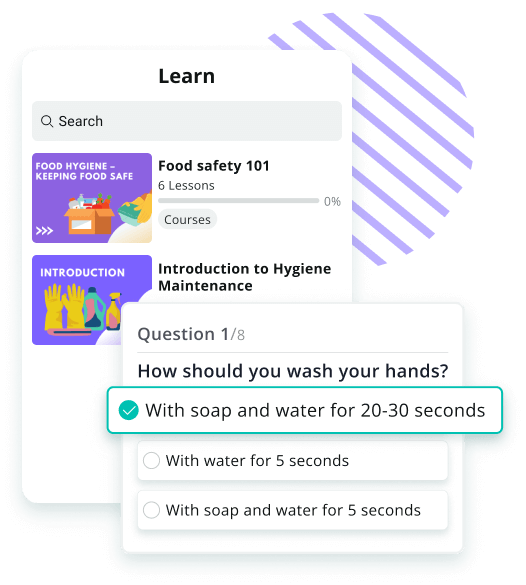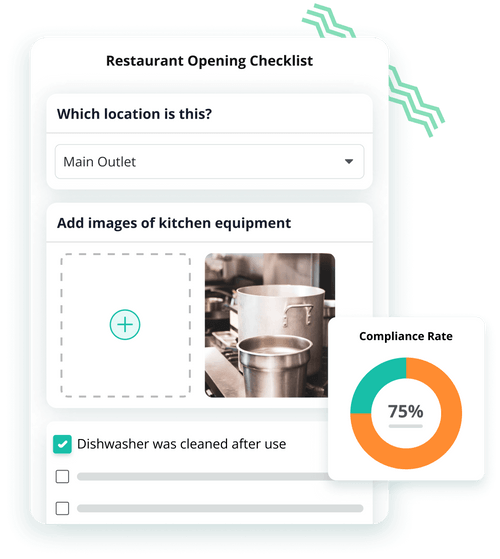The global food and beverage services market is projected to grow from $5.94 trillion in 2021 to $8.29 trillion by 2025. This immense growth presents both opportunities and challenges for those involved in the sector. Given the evolving customer expectations and innovative dining concepts, effective F&B management has become critical for business success and long-term sustainability in food service operations.
In this fast-paced industry, store managers, operations heads, and HR professionals across restaurant chains and retail outlets must stay ahead by mastering the core elements of F&B management. This expertise enables them to:
- Optimize inventory processes
- Manage costs with precision
- Elevate service quality
- Implement best practices efficiently
Our comprehensive guide offers practical insights and actionable strategies to help you thrive in this competitive field. Whether you’re involved in procurement, food safety, customer service, or staff training, you’ll find valuable information here to elevate your operations.
By applying the strategies shared in this guide, you can:
- Boost profitability
- Enhance customer satisfaction
- Streamline daily workflows
- Ensure regulatory compliance
Let’s get started!
What is Food and Beverage Management?
Food and beverage management encompasses the full spectrum of activities necessary for running food service establishments, from menu creation and supplier relationships to inventory control and customer interactions. It is essential for any hospitality business, as it dictates customer satisfaction, operational efficiency, and overall profitability.
In the hospitality industry, dining often serves as the cornerstone of a business’s reputation. Proper F&B management ensures high-quality, safe, and customer-pleasing food service. This involves attention to detail, from sourcing raw materials to presenting dishes impeccably.
Strategic planning is also crucial to adapt to market trends and consumer preferences. In a highly competitive market, retaining customer loyalty is vital for long-term profitability. Effective management practices enable businesses to navigate challenges like price volatility, supply chain issues, and changing health regulations.
Key Responsibilities of F&B Management

1. Menu Planning and Development
Crafting an appealing and diverse menu is a major responsibility of F&B managers. A successful menu should not only be visually appealing but also cater to various customer preferences, including dietary restrictions and trending tastes.
Key points to consider include:
- Creating a balanced selection that appeals to different tastes
- Incorporating options for specific diets and allergies
- Using seasonal ingredients to keep offerings fresh
- Staying informed on culinary trends
- Designing visually attractive menu layouts
A well-crafted menu elevates the dining experience and encourages repeat visits.
2. Procurement and Supply Management
Securing high-quality suppliers is essential to maintaining consistency in food and beverage services. F&B managers should build and nurture partnerships with reliable suppliers that offer premium products at competitive prices.
Responsibilities include:
- Selecting reputable suppliers
- Negotiating favorable contracts
- Monitoring supplier performance regularly
- Ensuring a reliable supply chain
This proactive approach helps control costs, maintain quality, and prevent supply disruptions, enabling consistent service delivery.
3. Inventory Control
Maintaining accurate inventory records is vital to prevent ingredient shortages and minimize waste. Effective inventory management helps businesses:
- Avoid stockouts
- Reduce food spoilage
- Cut down on overall waste, leading to cost savings
Advanced supply tracking systems offer real-time inventory visibility, trigger automatic reorder notifications, and provide best practices for efficient usage. This ensures a smoothly running kitchen and optimal stock levels.
4. Cost Management
Prudent cost management is a fundamental aspect of F&B operations. F&B managers should:
- Create and adhere to budgets
- Monitor daily expenses diligently
- Utilize resources efficiently
These strategies support financial stability, minimize waste, and boost the business’s profitability.

5. Quality Control
Ensuring food safety and maintaining high hygiene standards are non-negotiable in F&B management. However, quality control extends beyond safety protocols to encompass the entire dining experience.
F&B managers should:
- Comply with health and safety regulations
- Conduct regular audits and inspections
- Maintain stringent food hygiene practices
- Monitor and improve service quality
- Assess restaurant ambiance and gather customer feedback
A holistic approach to quality control ensures guests consistently enjoy a superior experience, encouraging loyalty and positive word-of-mouth.
6. Customer Service and Satisfaction
Training staff to deliver exceptional service is perhaps the most critical element of F&B management. This involves developing comprehensive service protocols and ensuring employees are both knowledgeable and courteous.
Key actions include:
- Implementing feedback systems for continuous improvement
- Ensuring staff are trained in customer interaction skills
High customer satisfaction leads to positive reviews, repeat business, and increased revenue.
Key Components of Effective F&B Management
To achieve seamless operations and maintain a competitive edge, F&B management must focus on several core components. Excelling in these areas enables food service businesses to meet customer expectations and succeed in a demanding market.
1. Staff Management and Training
Employees are the backbone of any successful food and beverage operation. Investing in comprehensive training programs not only equips your team with the necessary skills but also fosters a culture of excellence. Training should cover everything from food preparation and safety standards to customer service protocols.
This can all be streamlined with a food and beverage management software like KNOW. Using KNOW can transform this process by:
- Streamlining onboarding with user-friendly training modules that new hires can easily navigate.
- Ensuring consistent service quality across all locations through standardized training programs.
- Allowing managers to monitor training progress and identify areas for targeted improvement.
- Enhancing shift scheduling and attendance tracking to prevent overwork and promote team morale.

By utilizing such software, managers can ensure their operations are always adequately staffed while maintaining a motivated and skilled workforce.
2. Financial Management
Keeping a close eye on financial metrics is critical for any F&B business. Proper budgeting and cost control measures allow managers to allocate resources efficiently and make data-driven decisions that enhance profitability.
3. Operations Management
Smooth daily operations are the lifeline of any restaurant or food service business. This involves maintaining equipment, streamlining workflows, and ensuring adherence to standard operating procedures (SOPs).
Software like KNOW for managing SOPs, shift handovers, and daily reports can improve operational efficiency. KNOW empowers managers to achieve operational excellence through:
- Centralized SOPs for quick reference, ensuring all staff members follow the same guidelines.
- Efficient shift handovers with detailed communication logs that reduce errors and maintain service continuity.
- Comprehensive daily reports that provide insights into performance and highlight areas for improvement.
- Proactive maintenance schedules that minimize equipment downtime, ensuring smooth kitchen operations.
- Digital forms and audits that simplify compliance tracking, streamline reporting and ensure accurate documentation for inspections and regulatory standards.

4. Menu Planning and Development
A well-crafted menu is more than a list of dishes—it’s a strategic tool for driving customer interest and sales. Successful F&B managers keep their menus aligned with current trends, seasonal ingredients, and customer preferences.
Effective menu management involves:
- Continuous updates to maintain excitement and relevancy.
- Balancing nutritional value and flavor to cater to a wide range of diners.
- Designing attractive layouts that encourage customers to try new offerings.
5. Procurement and Supplier Management
Building strong supplier relationships is vital for ensuring the consistent quality of ingredients and supplies. This requires careful supplier selection, regular performance reviews, and strategic negotiations to get the best prices without compromising quality.
6. Enhance Customer Experience
Customer satisfaction goes beyond serving great food. The entire dining experience, from the ambiance and cleanliness to the service quality, plays a role in creating lasting impressions. Implementing feedback systems allows F&B managers to gather insights, address pain points, and develop strategies that elevate customer experiences.
Loyalty programs and personalized services can further strengthen customer relationships, encouraging repeat visits and word-of-mouth promotion.

How KNOW Transforms Food and Beverage Management
In today’s fast-paced food service environment, managing operations efficiently while maintaining high standards can be challenging. KNOW offers an all-in-one solution that empowers F&B managers to streamline operations, enhance team coordination, and ensure compliance effortlessly.
Why Choose KNOW for Your F&B Management Needs?
1. Simplified Staff Scheduling and Training
With KNOW, you can create seamless schedules that align with your business needs while avoiding staff burnout. The platform offers intuitive training tools that ensure new hires are well-prepared, and current staff remain up-to-date with the latest practices.
2. Real-Time Compliance and Quality Assurance
KNOW keeps you inspection-ready at all times by automating compliance tracking and providing instant alerts for updates. This proactive approach to quality control means your business adheres to industry regulations without the stress of last-minute preparations.
3. Enhanced Communication and Coordination
Miscommunications can disrupt operations and impact service quality. KNOW’s built-in communication features promote clarity, allowing teams to coordinate shifts, manage tasks, and share updates seamlessly. This results in smoother handovers and consistent service delivery.
4. Comprehensive Digital Logs and Reports
Accessing records and generating reports becomes effortless with KNOW’s user-friendly digital tools. From daily sales logs and inventory reports to staff performance data, all crucial information is just a click away. This ensures managers can make informed decisions quickly and keep operations running smoothly.
5. Operational Visibility and Incident Management
KNOW provides a 360-degree view of your operation, helping you spot potential issues before they escalate. With its incident management feature, any problems that do arise are resolved swiftly, reducing disruptions and maintaining service quality.
Experience Operational Excellence with KNOW
By integrating KNOW into your F&B management strategy, you gain a powerful tool that addresses everything from staff training and compliance to daily operations and communication. This comprehensive approach not only simplifies processes but also enhances team productivity and customer satisfaction.
Ready to elevate your food and beverage management? Book a free demo with our expert team today and discover how KNOW can transform your business operations.






![The 10 Best Restaurant Scheduling Software and Apps [2025] restaurant scheduling software](https://www.getknowapp.com/blog/wp-content/uploads/2024/09/restaurant-scheduling-software-360x240.png)







